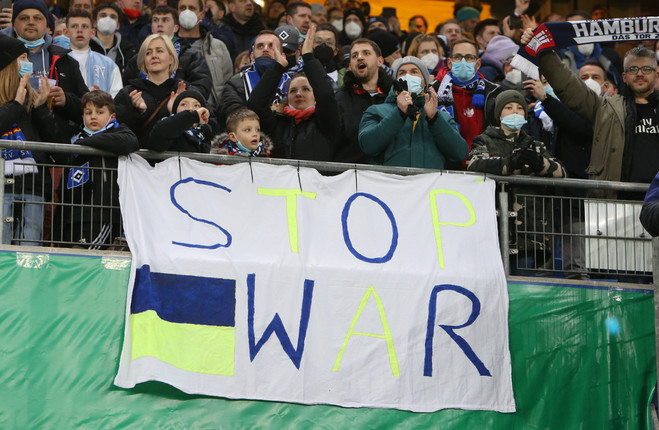1. In recent days, The Athletic has been in contact with executives, players and club employees from Ukrainian football. Stepanenko and SC Dnipro-1’s sporting director Gleb Platov have fled their homes but remain in danger. Roman Morozov, an employee at the trade union that represents footballers in Ukraine, left home with only his passport. His ex-wife and 12-year-old daughter drove for days, sleeping in the car, as they headed west towards the Romanian border. He says his union is aware of an academy graduate of a Ukrainian second division club who has been killed. According to reports, a second player, who represents one of Ukraine’s regional sides, was also killed following bombing at an apartment block.
The lead coaching staff of Ukraine’s women’s national team are Spanish and Andorran. Lluis Cortes, the manager, rode for 21 hours in a car, along with his assistant Jordi Escura and their agent. They then took a 12-hour train to escape over the border into Poland.
A cohort of Brazilian players, mostly from Shakhtar, were holed up in a Kyiv hotel before interventions from UEFA and several national embassies and football federations hatched an escape plan. Three Brazilian players from Zorya Luhansk, including the 18-year-old Guilherme Smith, have been less successful, travelling on foot for 30 miles on Saturday and only arriving in Poland on Tuesday.
Adam Crafton tells footballers’ stories from Ukraine, as their country is besieged by the barbarism of Vladimir Putin (€)
2. Winning the hosting rights for the 2014 Sochi Winter Olympics and the 2018 World Cup were masterclasses in the dark arts of global sports politics, and a financial bonanza for the regime’s closest allies. Around 50-60% of the $55bn bill for the Sochi games was alleged to have disappeared into private hands. The World Cup was, by contrast, a smaller affair, but even so the Kretovsky stadium in St Petersburg, built, in part, by North Korean near-slave labour, saw corruption send its costs rise seven-fold over the eight years it took to complete.
The Kremlin will, no doubt, have considered it money well spent. The 2018 World Cup was a very effective Potemkin village. For the duration of the tournament, public space was transformed. Where normally carousing and public drinking would be snuffed out by the police, they withdrew to the margins to create a sphere of permissible cosmopolitan hedonism, broadcast a million times over through social media.
It is worth recalling that the Kremlin chose the day of the opening game of the tournament to announce its hugely contentious pension reforms. This triggered Russia’s then biggest outbreak of public protest since the 2011 demonstrations against electoral manipulation. However, under a specific World Cup law that banned political demonstrations in host cities, these protests were rendered invisible to both domestic and international audiences.
With global sport now condemning Russia to pariah status, David Goldblatt writes for OpenDemocracy of how global sport has already served Putin’s needs, and why football needs urgent reform
3. As interesting as Kelleher’s transformation from a striker to keeper with Ringmahon Rangers is, particularly after his prowess from the penalty spot, it is difficult to compete with the story of Tom Farquharson.
Because the FA Cup triumph of 1927 — when he helped Cardiff City become the first and, to date, only non-English side to lift the trophy — is just one small part of it.
While Kelleher’s kitbag might have contained notes on Chelsea’s penalty takers, Farquharson’s was said to contain a gun.
A friend of future Taoiseach Seán Lemass in his youth, Farquharson’s cross-channel career was more by accident than design. And not only did he contribute to team success but he individually helped to ensure that Kelleher, like every other keeper, is obliged to remain on his goal line until a penalty is struck.
In the wake of Caoimhín Kelleher’s Cup success, Neil O’Riordan of the Irish Sun tells the remarkable tale of Tom Farquharson.
4. With the gentle touch of a man who has taught himself to accept the things in the world he cannot control, Pierce Higgins walks you through the most difficult journey imaginable, an almost unspeakable burden set to pillage him and his family of their future.
When Pierce first noticed a twitching in his thumb at the end of 2016, he put it down to the cold in his carpentry workshop. Yet the sensation never eased as the winter segued into spring and the hurling season began again.
The ash felt different in his hands. Catching the ball was his biggest issue so he just strapped up his thumbs. Yet when Pierce went to his physio Gerry O’Keeffe in Castlerea that summer, O’Keeffe said that he needed to visit his doctor.
After being referred to a neurologist in Sligo, he underwent a battery of tests. The diagnosis wasn’t definite, but all the signs pointed towards motor neurone disease.
Denial is often the first refuge of hope, but there was minimal substance in that pursuit. “You’re absolutely hoping it isn’t,” says Pierce. “But deep in my heart, I knew that it was.”
Writing for the Irish Examiner, Christy O’Connor meets brothers Pierce and Keith Higgins in the wake of Pierce’s diagnosis with Motor Neurone Disease.
5. The man who sells newspapers on O’Connell St is fervently, ardently and undeniably against smartphones.
Among other things – including any discussion of his real name or how long he has dabbled in the trade – the man who sells newspapers on O’Connell St is also against TikTok, online porn and what he calls “accountant-run” journalism. For a man whose livelihood is based around storytelling and truth, he favours anonymity above all else. These topics, among many others, are the subject of our offbeat chatter during last Wednesday’s sunny spell.
Found perched beneath the sunbleached cover of his decades-old newsstand, he remains resilient, in the face of a world now increasingly online. But not – it should be noted – without some bones to pick.
“The worst part about the whole business is that somebody like you, who has no affiliation with newspapers, doesn’t think they’re missing anything. So when they do go…” – he gestures toward his hodgepodge of the day’s red-tops and broadsheets – “they won’t be conscious of the fact that they’re gone, because you’ll never have them.”
Finally, for Trinity College paper The University Times, Faye Curran meets a newspaper vendor on O’Connell street for a wonderful insight into a vanishing era.

